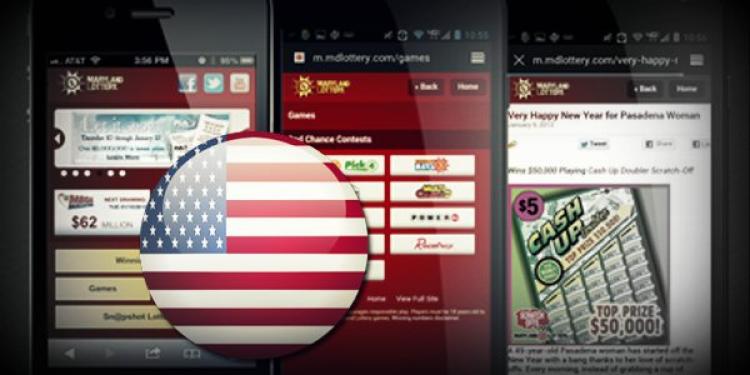Why the US is Slow to Reap the Benefits of Online Lottery Sales
Posted: November 9, 2014
Updated: June 4, 2017

Britons are buying online and mobile lottery tickets in droves. That has many wondering why Americans aren’t doing the same.
American lottery players want to know why they can’t buy tickets online or via mobile devices. Their cousins in the United Kingdom buy more than a billion dollars worth of lottery tickets per year using Lenovos and Nokias.
British operators have embraced the iGaming revolution; CEO Dianne Thompson of Camelot UK, the national lottery operator, retired this week after a 14-year tenure in which she helped pioneer online lottery in the country.
iGaming is here to stay, and people are placing more bets, playing more mobile casino games, and buying more lottery tickets on laptop computers and smartphones. Thompson was able to recognize that, and under her stewardship the company invested increasing amounts of revenue in online operations.
In 2013, Thompson’s last full year as Chairwoman, a full 15% of Camelot’s GBP 6.7 billion dollars in sales came from interactive services. She sees that as a trend that will only deepen, a sentiment which is also shared by the company’s competitors. In recent years the Health Lottery as well as sportsbetting outfits offering lottery services have also moved operations online.
People spend a large portion of their lives on the computer or mobile these days. British firms like Camelot have embraced change and are reaping the rewards. The national budget has also benefited. But across the Atlantic in the US, we see a very different story.
The US remains far behind
• In 2013 Camelot UK made more than $1 billion in revenue from interactive sales
• Online lottery has been legal in America since 2011
• Lottery tickets can be purchased online in only three US states: Illinois, Minnesota and Georgia
While online lottery is surging forward in the UK, it has barely gotten off the ground in the US. In only three states, Illinois, Minnesota and Georgia, are state lottery providers legally authorized to sell tickets via the internet. And Minnesota is the only one in which non-straight lottery sales (scratch tickets, for example) can be sold.
Americans spend just as much time on their devices as Britons, and the success of traditional lotteries in the country show that they love buying tickets and scratch cards as well. But the lack of online lottery offers is holding back sales and preventing the collection of much-needed tax revenue.
A study by UK-based research consultancy YouGov found that 27% of US adults are interested in buying lottery tickets either online or via mobile devices. More importantly, 8% of those who don’t currently play the lottery say they would if tickets were available on the internet.
One can observe a vast, untapped market in the US. Considering all the money that stands to be made by both state governments and the private operators they contract to run their lottery services, why hasn’t the US followed the example set by the UK.
The ghost of the Wire Act still looms large
Online lottery is new to the US largely because it was expressly banned by the federal government until 2011. All forms of online gambling, including casino gaming, sportsbetting, bingo and lottery, were prohibited according to the Justice Department’s (DOJ) interpretation of the 1961 Wire Act.
The Wire Act was originally drafted to prevent the proliferation of online gambling services via telephone. It was later expanded to include internet gambling. However, the language of the bill only mentioned sportsbetting by name.
In 2011 the State of New York and the State of Illinois asked the DOJ to clarify its stance, and in a landmark decision ruled that online lottery was legal as long as sales were not conducted across state borders.
While the DOJ decision was expected to open the floodgates, in reality online lottery has only come in a trickle. Only the trio of states mentioned above has launched online operations since 2011, and New York, who pressed for the DOJ decision, remains stuck in the 20th Century.
Several other states have debated legalization, but what was once thought to be a wave simply isn’t moving forward. That has would-be lottery players and some operators wondering why.
Inertia is holding the US back
The US is a huge country with several interwoven layers of legislative and bureaucratic machinery. When American gambling laws change on the federal level there is no guarantee that state governments will take advantage.
Firstly, some experts speculate that state lawmakers are concerned that the federal government could change its mind yet again, particularly if a Republican administration comes into office following the 2016 Presidential election. Gambling is a contentious issue in America, and some Republicans are staking their reputations on restricting or banning it.
On the other hand, some states have attempted to launch online lottery sales but come up against fierce opposition from anti-gambling groups. For example, when lawmakers in Wyoming legalized lottery for the first time in 2013, they had to agree not to sell any interactive gaming products, including online lottery tickets.
Given the persistent budget deficits faced by most US states, it would be surprising if more didn’t eventually start selling tickets over the internet (New York, Michigan and Colorado have come the closest over the past three years).
However, it looks like American lottery operators will continue to be stuck in the 20th Century while their counterparts in Britain shoot forward into the bright future of iGaming.












